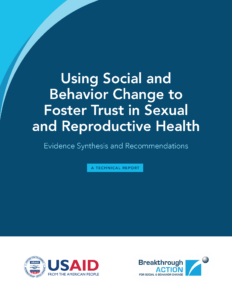The Global Shared Agenda for Social and Behavior Change in Family Planning identifies fostering a supportive environment for sexual and reproductive health (SRH) as a priority area. Trust is an essential component of a supportive SRH environment and benefits both clients and providers. Evidence shows that trust influences the adoption and maintenance of beneficial health behaviors and positive health outcomes for clients. It also yields positive benefits for providers, such as improving work satisfaction and collaboration.
Various determinants play out at different levels and influence trust between clients, communities, health providers, and institutions. To effect change, SBC practitioners need to understand what these determinants are, how they drive trust within SRH service delivery settings, and how trust shapes SRH demand, client—provider and community—facility interactions, contraceptive use, and client and provider behavior.
This technical report and brief, Using Social and Behavior Change to Foster Trust in Sexual and Reproductive Health: Evidence Synthesis and Recommendations, provides SBC practitioners with an overview of the determinants of trust in SRH and programmatic guidance on how to better foster trust in SRH-focused SBC programs. That understanding will equip them to design systematic and evidence-informed approaches that intentionally set up SRH service delivery settings to holistically enable, build, and sustain trust between clients, communities, health providers, and health facilities.


